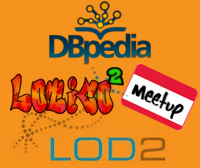
Session, THU 10:30 - 12:00
Enterprise Linked Data Applications
SKOS as the focal point of linked data strategies
The Simple Knowledge Organization System (SKOS) has become one of the ‘sweet spots’ in the linked data ecosystem in recent years. Especially when semantic web technologies are being adapted for the requirements of enterprises or public administration, SKOS has played a most central role to create knowledge graphs.
In this presentation we will describe why controlled vocabularies based on SKOS play a central role in a linked data strategy, and how SKOS can be enriched by ontologies and linked data to further improve semantic information management.
SKOS unfolds its potential at the intersection of three disciplines and their methods:
-
library sciences: taxonomy and thesaurus management
-
information sciences: knowledge engineering and ontology management
-
computational linguistics: text mining and entity extraction Linked Data based IT-architectures cover all three aspects and provide means for agile data, information, and knowledge management.
In this presentation, we will speak about the following questions and topics:
-
How SKOS builds the foundation of enterprise knowledge graphs to be enriched by additional vocabularies and ontologies?
-
How can knowledge graphs be used build the backbone of metadata services in organisations?
-
How text mining can be used to create high-quality taxonomies and thesauri?
-
How can knowledge graphs be used for enterprise information integration?
In addition we will have a look at the latest release of PoolParty Semantic Suite, presenting several live demos of end-user applications based on linked data.
About
Semantic Web Company (SWC) is a technology provider headquartered in Vienna (Austria). SWC supports organizations from all industrial sectors worldwide to improve their information management. Our core product has outstanding capabilities to extract meaning from big data by making use of linked data technologies. Our software supports the following issues of semantic information management:
-
managing corporate knowledge models
-
extract knowledge from big data via text mining
-
build recommender systems
-
link enterprise big data & open (government) data
On the market since 2009, PoolParty product family enables organisations from various sectors & global 500 companies to enter the age of semantic information management with scalable, easy to manage, corporate knowledge models. PoolParty APIs allow integration of semantic technologies with other systems like CMS, DMS, web shops or collaboration software like Confluence, Drupal or Sharepoint.
Andreas Blumauer
Andreas Blumauer, MSc IT studied Computer Sciences and Business Administration at the University of Vienna.
Since 2004, he is CEO and managing partner of the Semantic WebCompany. Andreas is experienced with large-scale IT-projects in various industry sectors, and he is also responsible for the product management of PoolParty Semantic Suite.
He has been a pioneer in the area of the semantic web since 2002; he is co-founder of SEMANTiCS conference series, co-editor and editor of one of the first comprehensive books in the area of the semantic web and linked data for the German speaking community.
Judicial knowledge platform JURION – Wolters Kluwer‘s way into the digital future
Technological innovations such as high-speed Internet connections and the widespread popularity of mobile devices provide the basis for an ever greater use of digital content.
To fully support legal research processes Wolters Kluwer created the digital legal knowledge platform JURION, which aggregates technical information from a variety of analog and digital media and information resources, provides a basis for editing, and links knowledge intelligently and interactively.
The JURION knowledge management component uses IntraFind’s Lucene-based enterprise search solution iFinder, which provides high-quality and thorough search results by using linguistic analyzers. Various filters, faceting and grouping based on semantic metadata enables easy navigation through existing content and leads users efficiently to the desired search results. Besides the semantic metadata provided for the documents by manual annotation we also use statistical and linguistic techniques to generate additional semantic metadata automatically.
The techniques used are automatic keyword generation (tag cloud generation and clustering) and automatic text classification according to a legal taxonomy.
Manuel Brunner
As Chief Scientific Officer of Intrafind Software AG, Christoph Goller is responsible for coordinating research activities within the company and with research centers and universities. Furthermore, he is responsible for the development of Intrafind´s text analytics components. He got a PhD in computer science from the Technical University of Munich where he worked on artificial intelligence, machine learning and knowledge representation. His main interests are scalable information retrieval, search-based applications, and text analytics. Christoph is Apache Lucene committer since 2004. He has accompanied dozens of commercial projects using Lucene and Solr and has more than 15 years of experience in information retrieval. Christoph is author of more than 15 scientific papers and frequently gives presentations on search related topics (e.g. at Lucene Revolution, Berlin Buzzwords, ApacheCon Europe).
Monitoring EPCIS Exceptions in linked traceability streams across supply chain business processes
The EPCIS specification provides an event oriented mechanism to record product movement information across stakeholders in supply chain business processes. Besides enabling the sharing of event based traceability datasets, track and trace implementati ons must also be equipped with the capabilities to validate integrity constraints and detect runtime exceptions without compromising the time-to-deliver schedule of the shipping and receiving parties.
In this paper we present a methodology for detecting exceptions arising during the processing of EPCIS event datasets. We propose an extension to the EEM ontology for modelling EPCIS exceptions and show how runtime exceptions can be detected and reported. We exemplify and evaluate our approach on an abstraction of the pharmaceuticals supply chain.
Monika Solanki and Christopher Brewster
Aston Business School, Aston University, UK
POSTER: LinDA - Visualising and Exploring Linked Data
The main goal of our work in the context of the LinDA (Linked Data Analytics) project is to offer small and medium sized enterprises (SMEs) possibilities for integrating and consuming data by using Linked Data technologies. One of the major challenges of this project consists in providing user-friendly means of exploring and visualising Linked Data. To achieve this, a Semantic Web application has been created, based on state-of-the-art linked data visualisation approaches, which allows a largely automatic matching and binding of data to visualisations.
Hence, in this demo paper we demonstrate the potential of a visualisation framework which is capable of dealing with different data formats, serialisations and Semantic Web ontologies.
Klaudia Thellmann, Fabrizio Orlandi and Soeren Auer
University of Bonn, Germany





